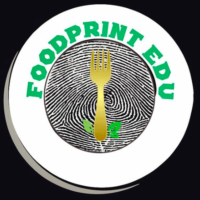By Brianna Betterson
Introduction
Did you know that one of the ways that we can live more sustainably and reduce our ecological footprints is to grow our own fruits, vegetables, and native flowers at home? Not only does home gardening allow you to control what chemicals make their way onto your food, but it also reduces how far food has to travel to get to your kitchen. This article will explore the benefits of home gardening for both the ecosystem and ourselves, and provide information on the basics of how to grow your own fruits, vegetables, and native flowers in a sustainable way.
The Importance of Sustainable Gardening
Moving towards a more sustainable global food system can start in our backyards. Conventional farming practices used in modern agriculture usually involve the heavy use of chemical fertilizers, pesticides, and herbicides. For instance, over 1.1 billion pounds of pesticides are used on crops every year in the United States (Environmental Protection Agency, 2017). Furthermore, while the amount of emissions associated with a food product largely has to do with what type of food is being produced, it was found that the transportation of food alone accounts for about 19% of emissions in our global food system (European Commission, 2023).
Benefits for the Ecosystem
By practicing sustainable gardening, we are encouraging local food production and reducing our reliance on industrial agriculture, helping to mitigate its impacts. With native flowers in particular, rather than harming wildlife, they instead encourage biodiversity by attracting and supporting pollinators. By virtue of being native, they are also already adapted to the local ecosystem. For this reason, native plants require less water and maintenance in comparison to non-native plants, making them ideal for low-maintenance gardens and those who are beginners.
Benefits for Ourselves
Growing our own fruits and vegetables can have numerous personal benefits as well. Growing our own food allows us to control what chemicals are used during the growing process, ensuring that our families are consuming safe and healthy produce. Gardening can also be an excellent form of exercise and stress relief, promoting physical and mental well-being. Some may also find that homegrown produce tastes better and is fresher than store-bought alternatives.
A Beginner’s Guide to Growing Fruits and Vegetables
For those who are new to gardening, the process of starting a home garden may seem daunting. However, with some basic knowledge and preparation, anyone can successfully grow fruits and vegetables at home. Here are some tips to get started!
- Choosing a location: Ensure that the area receives ample sunlight and has good drainage.
- Preparing the soil: Test the pH levels of your soil with a test kit, and tend to it if necessary. Adding organic matter like compost can improve the soil fertility and soil structure.
- Start with easy-to-grow varieties: Popular choices include tomatoes, peppers, cucumbers, carrots, lettuce, and potatoes.
- Avoid overwatering: This can lead to problems such as root rot. Well-drained soil might need to be watered twice a week. Soil covered by mulch retains water better, and may need to be watered less often.
- Pest control: Instead of turning to chemical pesticides, try natural options such as diluted castile soap spray, neem oil, or diatomaceous earth.

A Long Island backyard vegetable garden (Source: https://plantsomethingli.com/vegetable-containers/)
Long Island Native Flowers
Looking to start a flower garden with Long Island’s native flowers? Here are some popular options (Native Plants for Long Island Landscapes).
- Black-eyed Susan (Rudbeckia hirta) – Attracts butterflies and bees; and blooms from June to September.
- Bee Balm (Monarda didyma) – Attracts hummingbirds, butterflies, and bees; and blooms from July to August.
- Butterfly Bush (Buddleja davidii) – Attracts butterflies; and blooms from July to October.
- Eastern Purple Coneflower (Echinacea purpurea) – Attracts butterflies and bees; and blooms from July to September.

A pollinator garden full of Long Island native flowers (Source: https://www.rewildlongisland.org/rewildingprojects)
Strategies to Reduce Garden Waste
To minimize the creation of garden waste, one could implement the following strategies. You can consider turning food scraps, leaves, and lawn clippings into compost for your garden. It makes a nutrient-rich parent material for the soil. Applying a layer of organic mulch can also be beneficial, as it suppresses weeds without the use of herbicides and allows the soil to retain moisture. Lastly, one could also use rain barrels to collect rainwater to irrigate the garden with. This reduces one’s reliance on municipal water supplies.
Get Involved
ReWild Long Island is a non-profit organization dedicated to promoting sustainable landscaping. They provide both the education and tools needed to get started with growing one’s own pollinator garden, all with the aim of promoting biodiversity and climate resilience. Check out ReWild Long Island’s website (https://www.rewildlongisland.org/) to stay up to date with upcoming events.
Adelphi University, located on Long Island, is a registered arboretum and is home to both a student-run community vegetable garden and a native plant garden. Consider starting a community garden or encouraging native flowers in your school or neighborhood!

Adelphi University botany students renovating the campus’ native plant garden (Source: https://www.adelphi.edu/news/native-plant-garden-at-adelphi-redesigned-to-benefit-long-island-pollinators/)
Works Cited
Environmental Protection Agency. Pesticide Industry Sales and Usage. 2012.
European Commission. Field to fork: global food miles generate nearly 20% of all CO2 emissions from food. 2023.
Panchyk, Lizz. Native Plant Garden at Adelphi Redesigned to Benefit Long Island Pollinators. 2023. News at Adelphi.
Native Plants for Long Island Landscapes. North Hempstead NY.
https://northhempsteadny.gov/filestorage/16255/18642/30457/28202/Native_Plant_List.pdf
